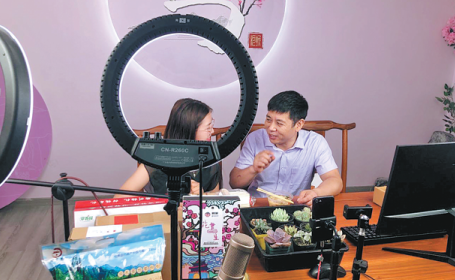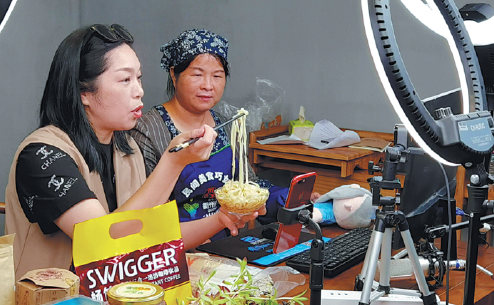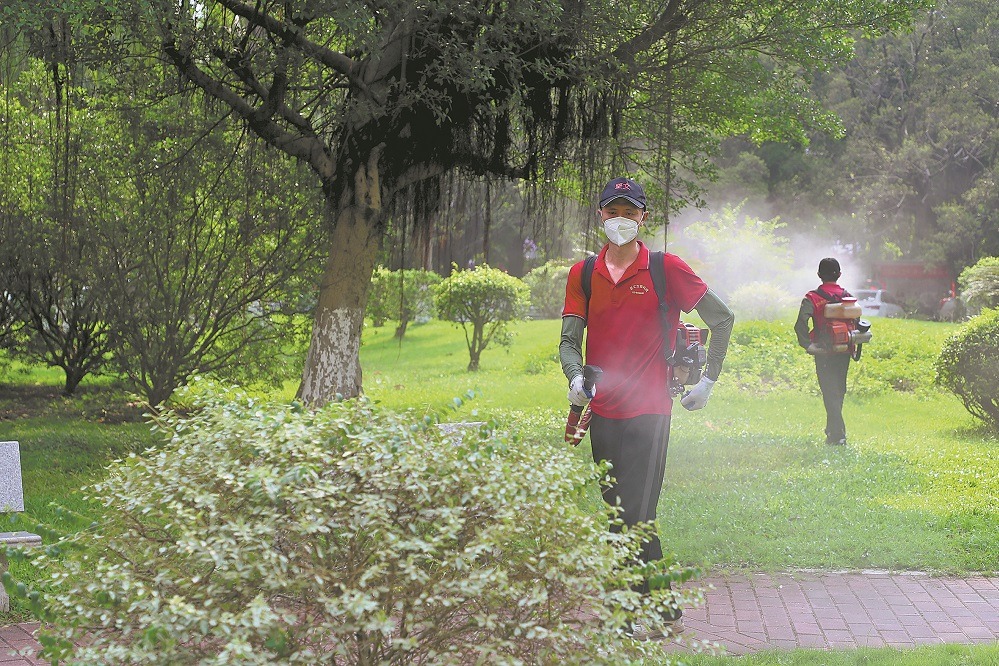Field of streams
Farmers in rural Zhejiang and the rest of the country are using e-commerce and livestreams to achieve prosperity, Ma Zhenhuan, Wang Lianqing and Luo Yu report in Quzhou, Zhejiang.

Xu Xiaohua sits in front of a ring-shaped LED light in rural Zhejiang province, presenting succulent plants grown in his greenhouse via livestream. This has become part of the 29-year-old farmer's nightly work routine.
Seven years ago, the livestream anchor was a staff member at an insurance company.
Driven by his love of succulents, Xu quit his job in 2014 and started a business growing the plants in Shangjiang village in Quzhou, Zhejiang province, with a 300,000 yuan ($43,100) loan.
Sales were tepid in the beginning-until he started livestreaming to promote online sales in 2016, a national trend that has continued injecting vitality into traditional businesses.
Quzhou's Kecheng district initiated a campaign in September 2019 to train farmers to become livestreaming anchors for the sales of agricultural products. Xu was one of the first trainees.
The training courses helped them learn about livestreaming techniques and presentation skills to appeal to audiences.
Xu is now an old hand at selling goods on livestreaming platforms after training and practice, which enables him to run his business steadily despite the COVID-19 epidemic.
He has over 200,000 followers on the short-video app, Douyin, and the e-commerce platform, Taobao.
Xu currently sells over 10,000 yuan worth of succulents a day at most, with 70 percent of sales coming from livestreams.
The deeply rooted stereotype of Chinese farmers bending to work in fields is changing as new technologies and advanced rural education have given them new identities and opportunities.
The central government stated in the 2020 work report that it will create more channels for rural residents to find employment and increase their incomes, and it will help them seek employment or start businesses near their homes.
Villages around the country are working to tap the development potential of rural areas and the talent of the people who live there.
Training for rural livestreaming anchors are being promoted throughout Quzhou, thanks to a project called "Rural Revitalization Lectures", which the city's government initiated in June 2019.
The project, designed to serve and educate rural people, is an attempt to better manage rural affairs by enriching villagers' lives with the latest information.
A document released by the government says that professionals are key to rural revitalization, and orderly training and lectures for villagers are necessary to compensate for the lack of professionals in modern agriculture, culture and tourism and e-commerce in the countryside.
There are more than 1,400 lecture halls for the project throughout Quzhou, and over 4,400 lectures with various themes have been delivered for people in villages over the past year.
In 2020, the city government announced it will invest another 75 million yuan in the "Rural Revitalization Lectures".
As online-sales channels become more effective, imparting knowledge about e-commerce to farmers has become an important mission of the project.
Over 1,200 e-commerce training courses have been organized based on the "Rural Revitalization Lectures" in Quzhou, and over 980 farmers have been engaging in livestreaming after the trainings.
Xu has become a lecturer, sharing his experiences and insights about e-commerce and livestreaming with other villagers.
Chen Jiasheng has found success through such training.
The 47-year-old's family has made noodles for generations.
He returned to open a noodle-making workshop in Kecheng's Doumulong village in 2010, after failing to earn a living outside.
His business has gotten a boost from livestreaming since July 2019, when he did his first broadcast.
"I was so nervous that I couldn't find the camera. A lecturer from the project told me how to look at the camera and present my noodles persuasively," Chen says.
The first attempt helped him sell more than 1,000 kilograms of noodles in less than 20 minutes, bringing in 8,000 yuan.
Now, Chen is quite skilled at doing livestreams.
He sold over 5 million yuan worth of noodles last year. And many villagers in Doumulong are involved in his handmade noodle business.
The COVID-19 epidemic hindered sales of such agricultural products as oranges in the first half of 2020. But Quzhou's livestreamers sold over 200,000 kilograms of oranges within two hours through livestreams, bringing wealth to the village despite the market downturn.
Zhejiang, an e-commerce hub in China, started a campaign on May 8 to cultivate a group of farmer anchors to advance rural revitalization across the province.
Initiated by the province's commerce department and Zhejiang-based e-commerce giant Alibaba Group, the campaign will help farmers use internet tools to increase incomes and improve livelihoods.
In the future, introducing products in front of cameras will be part of farmers' ordinary work.
Wu Fei, a professor at Zhejiang University's College of Media and International Culture, says livestreaming is more expressive and interactive than other communication approaches in the internet era.
It enables more people to become aware of small and medium-sized enterprises and, to some extent, saves on business-operation costs.
Qin Jirong contributed to the story.




Today's Top News
- China's data industry more than doubles in market size during 2021-2025 period
- Loan subsidies set to boost consumption
- Young people redefining summer tourism
- Protectionist's paradox could revitalize WTO
- Anti-aggression spirit still inspiring today
- Momentum builds in A-share market






























